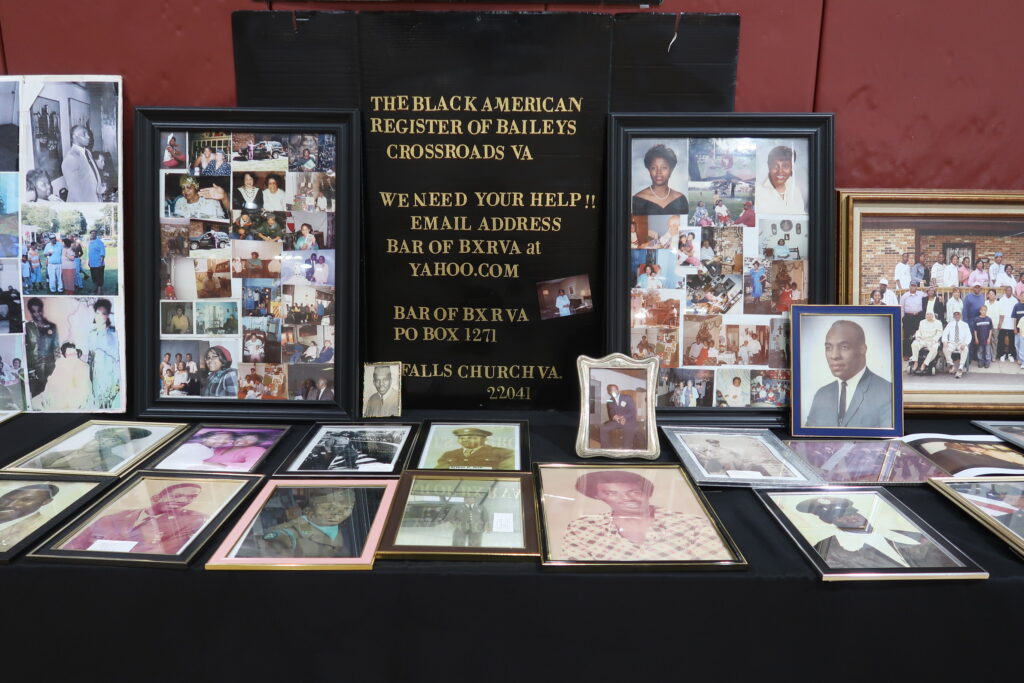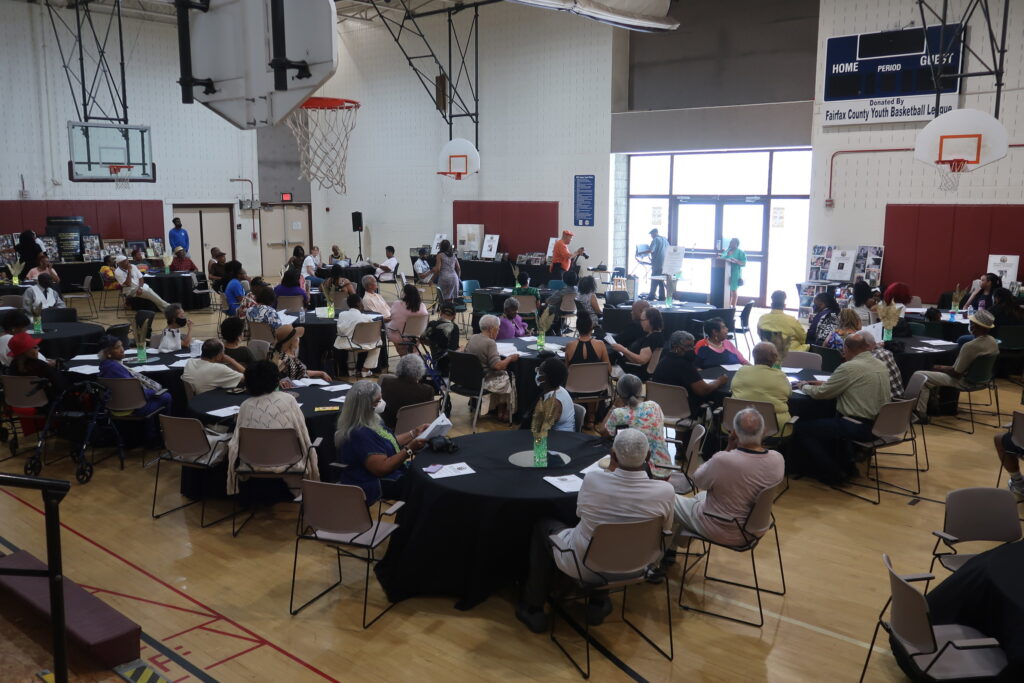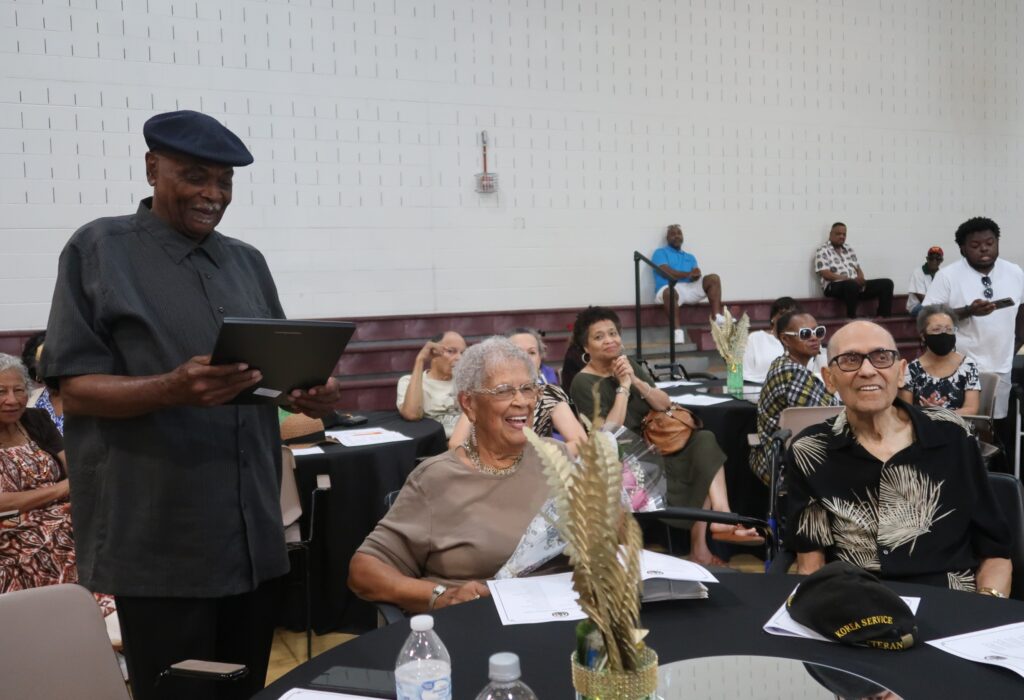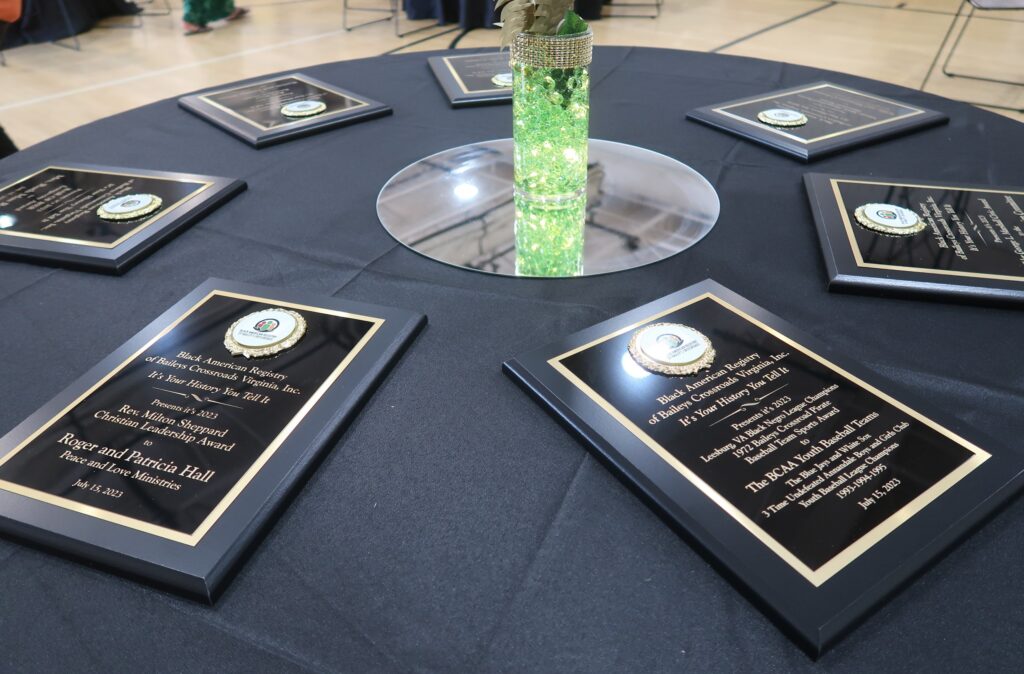A local Black community honors its history

More than a hundred current and former residents of Springdale came to the first-anniversary celebration of the Black American Registry of Bailey’s Crossroads to honor the people who made lasting contributions to the community.
The event, in the Bailey’s Community Center on July 15, featured an awards ceremony, photo displays, and an opportunity for people to reconnect with one another, share memories, and honor those who passed.
Preserving the past
The goal of the Black American Registry project is to identify the address of every Black family who lived in the Springdale neighborhood in Bailey’s Crossroads and document the history of a thriving tight-knit Black community threatened by gentrification.
Springdale is concentrated in the area around Lacey Boulevard, Magnolia Lane, Arnet Street, Munson Road, and Summers Lane. Many of the original houses have been replaced by McMansions.
“We want to remember those who came before us,” said Alyce Pope, a member of the Black American Registry of Bailey’s Crossroads Committee.
“This was a community where we all looked out for each other,” Pope said. “If somebody was hungry, somebody fed them, if somebody was lonely, somebody comforted them.”
She told the audience: “You have a responsibility to make sure our legacy is not lost.”
Related story: A Bailey’s Crossroads resident is documenting the history of a vibrant Black community
Julius “Poochie” Smith, the founder of the Bailey’s Crossroads registry project, presented the Longevity Award to Ruth Roberts, age 104, “the matriarch of our community.”
Ruth Roberts accepted the award surrounded by family members. She and her husband moved to Bailey’s Crossroads in 1946.
She took good care of her seven children, serving three meals a day, and doing laundry in a tub with a scrub board before they got a washing machine, her daughter recalled. She served on several committees at the Warner Baptist Church on Lacy Boulevard and later worked at the Higher Horizons Head Start center.
Community advocates
Pope presented the Minnie Marie Hungerford Peyton Historical Award to Willie and Margaret Coleman. Willie Coleman is president of the Springdale Civic Association. The Colemans have deep roots in the community and they make sure public officials understand the issues affecting Springdale residents, Pope said.
Minnie Peyton was a matriarch of the community who founded five churches, including Warner Baptist and Holy Scripture Church of Christ and donated land to Fairfax County for a school. Before the county was forced to integrate its schools, Black children from Bailey’s Crossroads had to go to Manassas to get an education, Pope said.

Mary Anne Cornish, the director of the Higher Horizons Head Start program, was honored with the Lillian Carey Education Award. Cornish recently retired after working at Higher Horizons for 46 years.
Lillian Carey was an itinerant teacher who served children in Arlington, Manassas, and Bailey’s Crossroads and later became the principal of the Bailey’s School, a two-room schoolhouse for Blacks.
Lillian Carey Elementary School served the Black community in Bailey’s Crossroads from 1956 to 1965. The building was later remodeled and repurposed as the Bailey’s Community Center.
The George Marshall Civic Award was presented to the Bailey’s Crossroads Reunion Committee. The committee organizes a huge family reunion every year that draws current and former residents, some of whom travel long distances for the event. The next one is Sept. 9.
Elder George Marshall was responsible for bringing sewers and water to the community and getting Lacy Boulevard paved, said Robert Wright, a member of the Black American Registry Committee.
As a religious leader, “he started from scratch,” Wright said. He preached in a tent on a baseball field, then relocated to an underground church in a building with a top story destroyed in a storm.
Marshall then established the Holy Scripture Church of Christ on Lacy Boulevard, where he served as pastor for 50 years. He died in November 2022.
Marshall was more than a religious leader, Wright said. He fought for civil rights, built several houses in Bailey’s Crossroads, and advocated for community improvements. He founded a program called HELP (Help Every Living Person) to provide free food and other assistance for those in need.

Smith presented the Rosa Wood Recreation Award to Juanita and Bertram White. The couple, married for 67 years, started a youth group and a dance team. In 1959, their dance team was the first Black group to appear on the Milt Grant Show, a local television program with a teen dance party format.
The Milton Sheppard Christian Leadership Award went to Roger and Patricia Hall. The Halls founded Peace and Love Ministries, which is dedicated to Christian values and support for the community.
Milton Sheppard, now deceased, was the pastor at Warner Baptist Church on Lacy Boulevard and Mt. Pleasant Baptist Church on Lincolnia Road.
The Bailey’s Crossroads Athletics Award went to the Blue Jays and White Sox youth baseball teams. The award was presented in honor of the 1972 Pirates baseball team, a Little League Championship winner.
Genealogical research
Annette Russell, the genealogist who is researching the neighborhood for the Bailey’s Crossroads registry project, has so far compiled information on 6,374 people who lived in Springdale.
Russell reviewed records going back to 1870, including property deeds, birth and death certificates, and military records. She is interviewing current and past residents and creating a database to be published online along with photos and family trees.
Along the way, she unearthed some interesting facts. For example, Lacy Boulevard was named for Winfield Scott Lacey (1855-1947), a White man who had a farm on Columbia Pike.
Russell lived in the Syphax Apartments in Springdale (now called Oakview Gardens) from age 6 to 17. The complex was named for Maria Syphax, a former slave who gave the land to her children, who later developed the apartments.

“People here are so very friendly,” said Barbara Malloy, a longtime resident of Oakview Gardens. “Everyone got along. Everyone looked out for everyone’s kids.”
Several people at the event had fond memories of “Sugar Lump,” a sweet lady who was a pillar of the community. Russell said Sugar Lump’s real name was Elizabeth Hudson Hall. She got her nickname because when she was young she would always take sugar lumps from the table.
Harrietta Fields said all the kids used to hang out at Minnie Peyton’s on Munson Road. Even though Fields moved to Richmond Highway in the early 1970s and now lives in Emporia, Va., she still regularly comes back to the old neighborhood for birthdays, holidays, and cookouts.
In a transient county, where many people don’t know their neighbors, Springdale was the place where everyone seemed like family – whether they were actually related or not – and that’s the community spirit the registry project is hoping to preserve.

Thank you for highlighting this event. I’ve learned so much.
How can I get in contact with the project committee?
The website for the Black American Registry of Bailey’s Crossroads is https://barbxr.org/.
Very close knit neighborhood. You either went to the scripture church or Warner Baptist . I remember at the end of Magnolia Lane there was a fence. This was in the 60s I remember sledding down